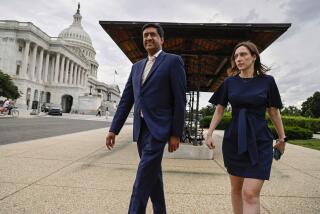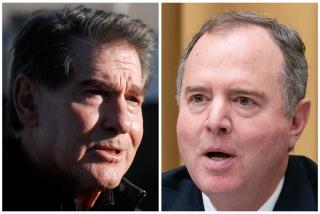Challenger in India Finds Nehru-Gandhi Dynasty a Tough Opponent
- Share via
MATHURA, India — It is only 100 miles from the Indian capital of New Delhi to Mathura, a grimy city on the Jamuna River that is revered by Hindus as the birthplace of Krishna, one of the most popular figures in the Hindu pantheon.
But it took nearly 10 dusty hours for the automobile caravan of Vishwanath Pratap Singh to reach the park where his newly created Jan Morcha (Peoples’ Front) political movement held its first public rally recently.
Singh, 56, is a former Cabinet minister who has been politically reincarnated as the leader of a populist movement formed to unseat his former boss, Prime Minister Rajiv Gandhi. By the time he reached the speaker’s platform in Mathura’s park, no more than 30,000 people--minuscule by Indian standards--and a few dozen bright green alexandrine parakeets perched in the treetops were on hand to hear him speak.
‘Something Fishy’
“How many of you out there,” he asked in Hindi, “think there is something black in the lentil soup--something fishy going on in the government?”
There was an enthusiastic show of hands. But before he could finish his speech decrying corruption and waste in the Gandhi government, a number of people, impatient after hours of waiting, stood up to leave.
It was rude treatment for the man considered by many to be the most promising challenger in years to the Nehru-Gandhi dynasty that has ruled India for all but four of the 40 years since independence. Not since the late socialist Jaya Prakash Narayan spearheaded a briefly successful movement to unseat Indira Gandhi in 1977 has anyone shown so much potential as an opposition leader.
More than anything else, Singh’s deflating experience in the park emphasized the difficulty faced by anyone who attempts to take on one of the most successful political families in history.
For 36 of its 40 years as the world’s most populous democracy, India has been ruled by the same family, first by Jawaharlal Nehru (1947-1964); then by his daughter, Indira Gandhi (1966-1977 and 1980-1984) and since her assassination in 1984, by her son, Rajiv Gandhi.
A Common Name
The Gandhi name is known to almost everyone in India, even the two-thirds of the population that cannot read or write. But many Indians confuse the ruling family name with that of Mohandas K. (Mahatma) Gandhi, the famous independence leader and founder of nonviolent civil disobedience. They are not related; Gandhi is a relatively common name in India.
Only once, in 1977 after the turmoil that followed Indira Gandhi’s imposition of “emergency rule” in 1975, has the family actually been voted out of power, and that period lasted less than three years. In 1964, after Nehru’s death, Lal Bahadur Shastri served as prime minister until he died in early 1966. Indira Gandhi was elected to replace him in 1966, in her first bid for elected office.
Singh, who was finance minister and defense minister under Rajiv Gandhi, was removed from office and expelled from the ruling Congress-I Party last spring after he ordered an investigation into alleged kickbacks to party members by a West German firm that sold submarines to the Indian navy.
Since then, he has mounted a national anti-corruption campaign and persuaded several dozen former Gandhi allies to join him in an effort to unseat the government.
So far, the government, which commands an overwhelming majority in Parliament, has been shaken but not seriously damaged by the Singh campaign. Barring some spectacular development, it is considered unlikely that Gandhi will be toppled, particularly not before the elections scheduled for no later than two years from now.
A ‘White Knight’
However, Singh, the adopted son of a feudal landlord in the state of Uttar Pradesh, is seen by many as a sort of white knight, committed to rooting out the corruption that has come to be identified with political life here. During his controversial stint as finance minister, he refused to associate with business leaders and even jailed several prominent businessmen for violating foreign exchange laws.
The dimensions of the challenge facing Singh and his colleagues was made obvious recently to a group of reporters who followed Singh through a day on the campaign trail. By the end of the day, the crusade that had begun so buoyantly that morning, back in Singh’s New Delhi bungalow, was sagging badly.
At dozens of brief stops along the way, Singh was draped with marigolds, showered with rose petals and weighed on scales balanced with coins that were then donated to his movement. He traveled by car, truck and tractor.
Yet after a rigorous day of campaigning Indian-style, he had managed to appear before fewer than 50,000 people, a mere handful of the Indian electorate of more than 300 million.
The final insult was the lukewarm reception at the Mathura park. This appearance was to have set the stage for subsequent events across the country, including visits later in the month to Bihar, where Narayan had staged his greatest rallies.
One-Rupee Donation
To finance his Peoples’ Front, Singh has asked for a one-rupee (eight cents) annual donation from each of his followers. The maximum contribution his movement will accept from an individual, he said in an October press conference announcing the creation of the movement, is 1,000 rupees ($80).
The front’s books, unlike those of the Gandhi party, will be open to the public, he said. Election reform, in fact, is one of the main elements of the movement’s manifesto. Singh advocates state funding of political campaigns.
“One simple question exposes the whole system we are running,” the manifesto says. “Can a common man contest elections on his own resources?”
In recent speeches, Singh was realistic about his handicaps in facing the Gandhi political machine. Although he has the support of the country’s largest newspaper chain, the Indian Express group, he does not have access to the government television network that almost every night features film on the prime minister.
“We do not have television or helicopters or helipads,” Singh said, referring to the ruling party’s widespread campaign use of leased Indian air force helicopters.
Helicopter Campaign
A reporter who traveled with Gandhi in the campaign for the state elections of 1985 noted that the prime minister was able to appear before more than a million people in 14 cities in just two days, flying by helicopter and using state party workers to do the groundwork.
In brief stops along the highway leading to Mathura, Singh hammered at the theme of corruption in government before such groups as the Haryana Young Farmers’ Forum. Referring to the admission by the Swedish Bofors Co. that it paid a $40-million commission to an unidentified agent to obtain Indian artillery contracts for howitzers, Singh said, “Just think how many schools and hospitals and wells you could have for this.”
There was some indication that his message was not getting across. A few in the crowd confessed to reporters that they had come hoping to see Rajiv Gandhi. Still, Singh remained optimistic.
“It is very surprising,” he said in an interview, “how the issues of the situation have percolated right down to the level of the village hut.”
It is almost impossible in India, except in the two Communist parties and perhaps in the regional linguistic parties, to receive any national exposure as a politician without first having served in the ruling party. Before his break with Gandhi last spring, which led to his expulsion from the party, Singh had served it faithfully, when it was called the Congress and afterward, when it became the Congress-I (for Indira).
Jailed With Gandhi
For example, when Indira Gandhi was jailed by the interim Janata Party government, Singh went to jail as an expression of solidarity with his leader.
Now, in attacking Rajiv Gandhi, Singh is forced to make a distinction between him and his mother and grandfather, always a risky proposition in family-oriented India.
“First there was the founder of modern India, Jawaharlal Nehru,” Singh says. “Then there was Indira Gandhi, the great leader of our country. But it was through a democratic process that both acted and which has been corrupted today.”
Even if Singh should succeed in his campaign, he will owe his victory in part to the Nehru-Gandhi family. Sharing the podium with him on a recent day of campaigning was Arun Nehru, a cousin of Rajiv Gandhi.
Arun Nehru is known to harbor ambitions of his own for the prime minister’s office. And it was apparent that a large number of those who turned out had come to see a member of the ruling family rather than the populist Vishwanath Pratap Singh.
More to Read
Sign up for Essential California
The most important California stories and recommendations in your inbox every morning.
You may occasionally receive promotional content from the Los Angeles Times.













